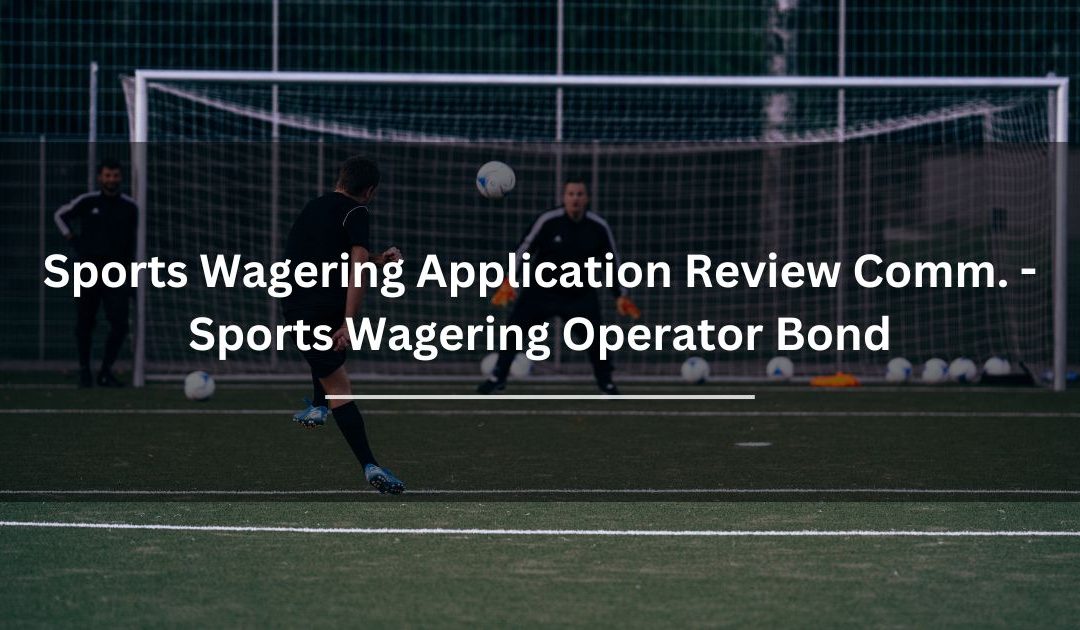Get an Instant Quote on Sports Wagering Operator Bond
Introduction
From our perspective, the expanding sports wagering industry in Maryland presents lucrative opportunities for operators, but it also introduces regulatory challenges. To protect public interests and maintain compliance with state laws, Maryland requires a Sports Wagering Application Review Comm. - Sports Wagering Operator Bond as part of the licensing process. This bond guarantees that licensed operators follow all state regulations and fulfill their financial obligations to the state.
Like the Montgomery County, MD - Sediment Control Bond, which ensures that developers prevent erosion and sediment runoff, the sports wagering operator bond safeguards the integrity of the gaming industry. It holds operators accountable for adhering to established rules and maintaining ethical standards, protecting both the public and the state.

Misunderstandings About Sports Wagering Operator Bonds
We’ve noticed that many prospective sports wagering operators misunderstand the requirements and purpose of the Sports Wagering Application Review Comm. - Sports Wagering Operator Bond. Some believe that obtaining a license is the final step to begin operations, without realizing that securing a bond is a mandatory prerequisite.
Others assume that the bond only covers financial obligations, overlooking its role in ensuring adherence to operational guidelines set by the Maryland Sports Wagering Application Review Commission (SWARC). Misunderstandings like these can lead to delays in obtaining licenses and possible regulatory penalties. Similar misunderstandings often arise with the Montgomery County, MD - Sediment Control Bond, where developers may overlook the need to secure this bond before starting construction.
Swiftbonds: Guiding Operators Through Compliance
Based on our experience, Swiftbonds has successfully assisted numerous applicants in securing the Sports Wagering Application Review Comm. - Sports Wagering Operator Bond. Swiftbonds simplifies the application and bonding process, ensuring that operators submit the necessary documentation and maintain compliance with Maryland regulations. Just as Swiftbonds assists developers in obtaining a Town of Easton, MD - Demolition Permit ($2,500) Bond to comply with local demolition requirements, it also helps gaming operators meet their bonding obligations efficiently.

Steps to Secure a Sports Wagering Operator Bond
What we’ve discovered is that securing a Sports Wagering Application Review Comm. - Sports Wagering Operator Bond involves several critical steps to protect public interests and ensure compliance with Maryland's regulations:
-
Review Bond Requirements – Understand the bond requirements established by the Maryland Lottery and Gaming Control Agency (MLGCA) and SWARC.
-
Choose a Reliable Surety Provider – Select a reputable surety provider like Swiftbonds to obtain the bond and ensure compliance with regulatory guidelines.
-
Complete the Application – Submit all required documents, including financial statements, proof of license eligibility, and other supporting materials.
-
Pay the Bond Premium – The premium amount is determined based on the operator’s financial stability, experience, and the bond amount.
-
File the Bond – Submit the bond to the MLGCA to finalize the licensing process and begin legal operations.
Swiftbonds provides expert guidance through each step, ensuring that applicants meet all bonding requirements efficiently.
Consequences of Non-Compliance in the Sports Wagering Industry
In our observation, failing to secure a Sports Wagering Application Review Comm. - Sports Wagering Operator Bond or comply with Maryland’s gaming regulations can lead to serious consequences. Operators who neglect these requirements risk losing their licenses, facing financial penalties, and potentially damaging their reputations.
Non-compliance may also result in claims against the bond, which can lead to costly reimbursements and suspension of gaming activities. Similarly, failure to obtain the Montgomery County, MD - Sediment Control Bond before starting a construction project can result in regulatory action and project delays.

Benefits of Obtaining a Sports Wagering Operator Bond
We’ve learned that securing a Sports Wagering Application Review Comm. - Sports Wagering Operator Bond offers numerous benefits for operators and the public, including:
-
Regulatory Compliance – Demonstrates that the operator is committed to adhering to Maryland’s gaming regulations and maintaining industry standards.
-
Financial Accountability – Ensures that operators fulfill their financial obligations to the state, protecting public funds.
-
Public Trust – Builds confidence among consumers by ensuring that licensed operators operate ethically and responsibly.
These advantages align with those provided by the Town of Easton, MD - Demolition Permit ($2,500) Bond, which ensures that demolition activities comply with local safety regulations and protect public interests.
Compliance with Maryland's Gaming and Bonding Regulations
Maryland enforces strict regulations to maintain the integrity of the sports wagering industry. The Sports Wagering Application Review Comm. - Sports Wagering Operator Bond serves as a financial guarantee that operators will comply with all licensing requirements and operational guidelines. Failure to comply can result in claims against the bond, suspension of the license, and possible legal action.
The Maryland Lottery and Gaming Control Agency (MLGCA) and SWARC oversee the licensing and bonding process for sports wagering operators. These agencies ensure that operators meet the highest standards of integrity and financial responsibility, protecting public interests. Similar regulatory oversight applies to the Montgomery County, MD - Sediment Control Bond, where developers must comply with local environmental standards before initiating construction projects.

Conclusion
We’ve come to appreciate that securing a Sports Wagering Application Review Comm. - Sports Wagering Operator Bond is an important step for operators seeking to participate in Maryland’s gaming industry. This bond protects public interests, ensures financial accountability, and promotes compliance with state regulations.
Swiftbonds provides expert guidance to applicants throughout the bonding process, helping operators meet all regulatory requirements efficiently. Whether obtaining a Sports Wagering Application Review Comm. - Sports Wagering Operator Bond or a Town of Easton, MD - Demolition Permit ($2,500) Bond, Swiftbonds delivers reliable solutions that safeguard the interests of operators and the public.
Frequently Asked Questions
Who is required to obtain this bond?
All sports wagering operators applying for a license through the Maryland Sports Wagering Application Review Commission (SWARC) must secure this bond. It guarantees compliance with state regulations and protects public funds.
How long does a Sports Wagering Operator Bond remain valid?
The bond remains valid as long as the operator maintains an active license. It must be renewed periodically based on the terms specified by the Maryland Lottery and Gaming Control Agency (MLGCA).
How is the bond amount determined for sports wagering operators?
The bond amount is determined based on the operator’s financial standing, operational scale, and the risk level associated with their activities. SWARC and the MLGCA set the required bond amount for each operator.
What happens if an operator violates state regulations?
If an operator fails to comply with Maryland’s gaming laws or fails to meet financial obligations, a claim can be filed against the bond. The surety provider compensates the state, and the operator is required to reimburse the surety for the amount paid.
How do these bonds differ?
A Sports Wagering Application Review Comm. - Sports Wagering Operator Bond guarantees compliance with Maryland’s gaming regulations, while a Montgomery County, MD - Sediment Control Bond ensures that developers implement proper erosion control measures during construction. Both bonds protect public interests but serve distinct regulatory purposes.


